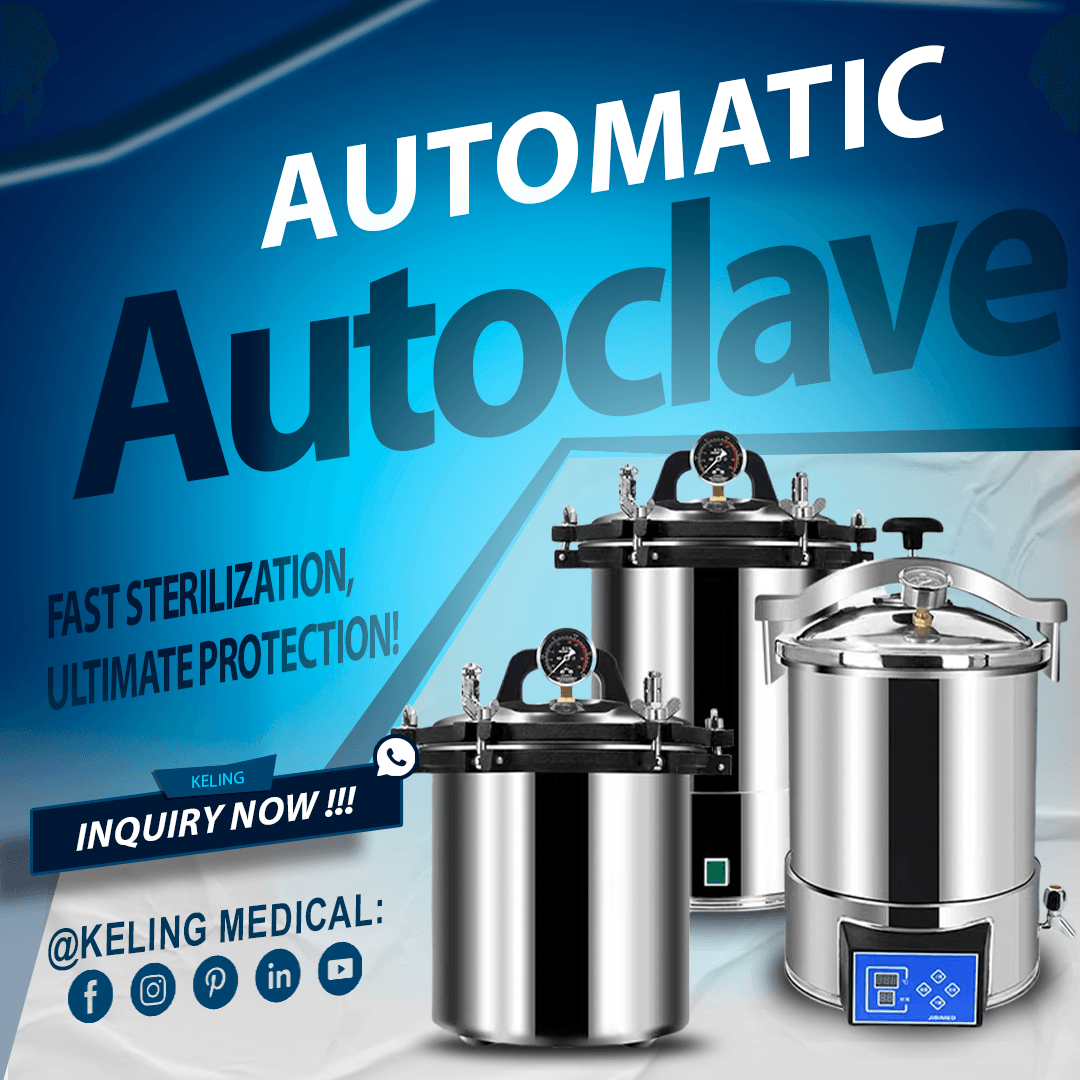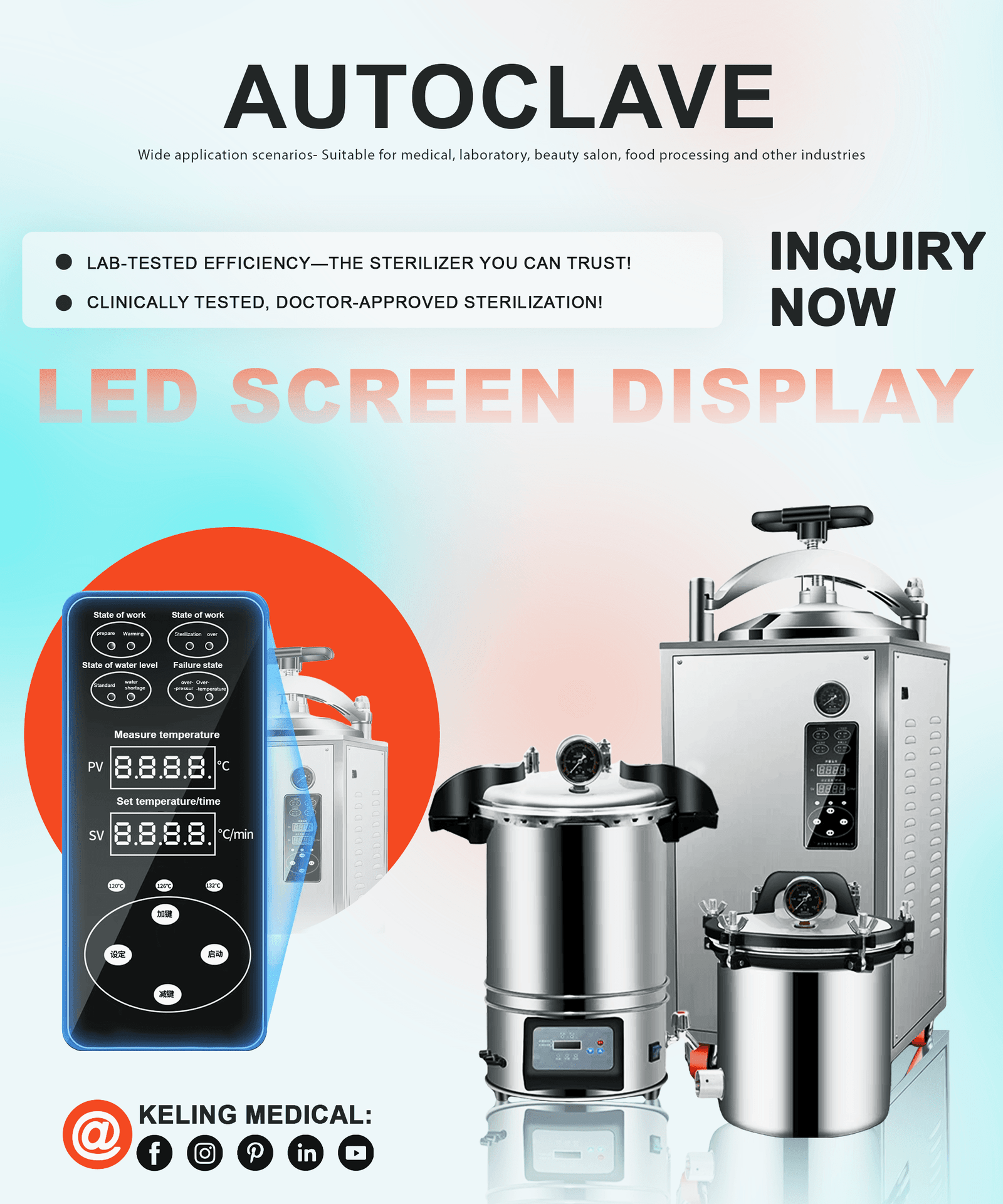
The article investigates the characteristics and advantages of dental autoclave machines by underscoring their importance in sustaining hygienic conditions and regulatory compliance within dental clinics. Medical equipment distributors, dealers, and procurement professionals will find this guide essential for understanding the crucial role dental autoclaves play in the industry.
Dental autoclave machines function as specialized devices that sterilize dental tools using high-pressure steam. The machine functions within a temperature range of 121°C to 134°C to kill all bacteria, viruses, and spores which guarantees instrument safety.
The use of autoclaves in sterilization processes helps remove infectious agents thereby protecting medical personnel and patients from infections.
Health authorities require dental clinics to use sterilization equipment such as autoclaves to ensure safety and compliance.
Autoclaves provide environmental benefits by sterilizing instruments for reuse which reduces waste production.
The advanced features available in current dental autoclave machines serve to both optimize their performance and simplify their operation.
Precise temperature management allows for successful sterilization while preventing damage to dental instruments. Autoclaves function at temperatures between 121°C and 134°C because automated systems maintain consistent heat levels throughout the sterilization process.
Different sterilization cycles in dental autoclaves make them suitable for various dental instruments.
Pre-Vacuum Cycles remove air using vacuum technology before introducing steam which ensures uniform sterilization.
Gravity Cycles utilize natural gravity to remove air from the chamber which makes them perfect for sterilizing straightforward instruments.
Flash Sterilization allows rapid sterilization of instruments during emergencies using a quick cycle that takes only minutes.
Pressure Gauges ensure safe operation by monitoring chamber pressure levels to avoid overloading.
The automatic shut-off feature terminates the sterilization cycle when it identifies unsafe operating conditions.
Door locks ensure operator safety by preventing the door from opening during the sterilization cycle.
A drying phase exists in many autoclaves which eliminates moisture from sterilized instruments to protect them from contamination during storage.
Today’s autoclaves come equipped with digital displays and customizable settings to simplify operation.
Dental practices benefit from various advantages when they purchase dental autoclave machines.
Dental instruments can be quickly and consistently sterilized using autoclaves which helps make them ready for immediate use.
Dental autoclaves sterilize everything from uncomplicated tools such as mirrors to complex devices with detailed components.
Autoclaves enable dental clinics to meet health authority sterilization requirements while avoiding legal and financial risks.
Autoclaves require a substantial initial investment but lead to long-term savings by prolonging the usable life of reusable dental instruments.
Clinics which maintain high sterilization standards develop patient trust while boosting their image of safety and professional care.
The sterilization capabilities of autoclaves help decrease the usage of disposable tools while promoting environmental sustainability.
Choosing the appropriate dental autoclave machine is essential to meet your dental practice’s specific requirements.
The selection process for an autoclave should align with the unique requirements of your dental practice.
Jauda: Select an autoclave size that corresponds to the daily instrument processing needs of your clinic.
Cycle Types: The autoclave should provide appropriate cycles to sterilize your instruments effectively.
Lietošanas ērtums: Your selection should include autoclaves that provide digital displays and automation features.
Tehniskās apkopes prasības: Select an autoclave model that demands very little upkeep.
Atbilstība: Check if the autoclave achieves compliance with global sterilization standards.
For more guidance, check out our related article: How to Choose the Best Medical Autoclave.
A dental autoclave machine is an indispensable tool for ensuring the safety and hygiene of dental instruments. With features like temperature control, advanced sterilization cycles, and safety mechanisms, autoclaves provide a reliable solution for infection control.
By investing in a high-quality autoclave, dental clinics can protect their patients, comply with health regulations, and enhance their reputation.
For further insights, explore our related article: Dental Steam Sterilizer vs. Dry Heat Sterilizer: Which is Better?.
If you’re looking for reliable dental autoclaves, Keling Medical offers a wide range of options tailored to the needs of dental practices.
A dental autoclave machine is a device that uses high-pressure steam to sterilize dental instruments, ensuring they are free from harmful microorganisms.
Dental autoclaves are essential for preventing infections, complying with health regulations, and maintaining a safe environment for patients and staff.
Common cycles include pre-vacuum, gravity, and flash sterilization, each suited for different types of instruments.
Regular cleaning, using distilled water, and following the manufacturer’s maintenance guidelines are key to ensuring optimal performance.
You can explore a variety of dental autoclaves on Keling Medical tīmekļa vietne.
Lai iegūtu vairāk informācijas vai uzzinātu par mūsu produktiem, sazinieties ar mums:
E-pasts: inquiry@shkeling.com
WhatsApp: Noklikšķiniet, lai tērzētu
Tīmekļa vietne: https://autoclaveequipment.com/

Ievads Slimnīcās izmantotās autoklāvmašīnas ir viens no svarīgākajiem ieguldījumiem veselības aprūpes infrastruktūrā, jo tās kalpo kā pirmā aizsardzības līnija pret infekcijām, kas saistītas ar veselības aprūpi. Sarežģītas sterilizācijas iekārtas ir

Autoklāvēšanas process ir būtiska sterilizācijas prakse, ko izmanto medicīnas, laboratoriju un pētniecības iestādēs, lai efektīvi sterilizējot aizsargātu stikla izstrādājumus un instrumentus. Augstspiediena tvaiks iznīcina patogēnus šīs procedūras laikā.

Autoklāvēšanas process ir būtiska sterilizācijas prakse, ko izmanto medicīnas, laboratoriju un pētniecības iestādēs, lai efektīvi sterilizējot aizsargātu stikla izstrādājumus un instrumentus. Augstspiediena tvaiks iznīcina patogēnus šīs procedūras laikā.

Autoklāvēšanas process ir būtiska sterilizācijas prakse, ko izmanto medicīnas, laboratoriju un pētniecības iestādēs, lai efektīvi sterilizējot aizsargātu stikla izstrādājumus un instrumentus. Augstspiediena tvaiks iznīcina patogēnus šīs procedūras laikā.

Autoklāvēšanas process ir būtiska sterilizācijas prakse, ko izmanto medicīnas, laboratoriju un pētniecības iestādēs, lai efektīvi sterilizējot aizsargātu stikla izstrādājumus un instrumentus. Augstspiediena tvaiks iznīcina patogēnus šīs procedūras laikā.
Autoklāvēšanas process ir būtiska sterilizācijas prakse, ko izmanto medicīnas, laboratoriju un pētniecības iestādēs, lai efektīvi sterilizējot aizsargātu stikla izstrādājumus un instrumentus. Augstspiediena tvaiks iznīcina patogēnus šīs procedūras laikā.